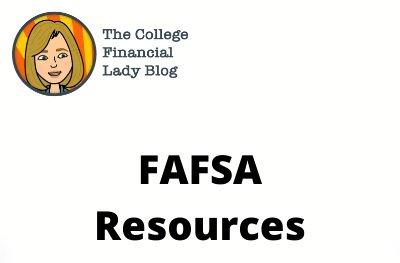
Featured
The new Simplified FAFSA is here! Here’s a quick video with some tips that will help you get through it with a minimum of chaos and maximum of financial aid. 🔗
Most recent posts
Yes, your household expenses will change when your student goes away to school. But be careful making assumptions about how much extra money you’ll have available to pay for college.
It’s tax time, which means it’s time to claim education tax credits you may be eligible for. Unfortunately, a lot of tax software programs don’t provide good instructions for doing so. Here’s what you need to know.
A lot of financial advisors tell clients not to use 529s for college savings. If that’s what yours says, you might ask whether they’re acting in your best interest.
Form 1098-T is a tuition statement that students receive from their college. Form 1098-T isn't filed with your taxes; instead, you use the information to file and then keep it for your records.
Highlights
Happy 2026! Last year I made a New Year’s Resolution and kept it. That makes me a self-appointed expert on New Year’s resolutions. Here are some resolutions for parents planning for college— and my expert advice on how to keep your resolutions.
Filing the FAFSA and CSS Profile raises tons of questions for divorced parents. Here are some answers.
We’re almost there: acceptance letters are arriving and the May 1 decision day is right around the corner. For most families, how much schools cost is part of the decision making process.
What is and isn’t an asset on the FAFSA? Here’s a quick “is it or isn’t it?” for you.
Parent assets seem to be the area that most families and planners focus on, despite the fact that they typically have the smallest impact on the formula of each of the components. Strategies and tactics to minimize parent assets abound, but for most families these result more in nibbling around the edges than actually making a significant dent in SAI.
The College Board’s annual Trends in College Pricing and Student Aid report was released recently. Among the headline findings: college tuition prices increased at extremely low rates for the second year in a row, reflecting both a combination of continued impacts of the pandemic and enrollment pressures from demographic trends.
Happy FAFSA Day! Are you completing the FAFSA for the first time this year? While you’re waiting for the site to load, here are some resources that will help you get through it with a minimum of chaos and maximum of financial aid.
I think Oregon is one of the last places in the US that starts school after Labor Day so my apologies if you’re no longer in back-to-school mode. Here are some resolutions your family might make for the coming school year. And, here’s hoping they don’t get broken as quickly as the typical New Year’s diet-and-exercise resolutions!
Categories
The FAFSA & CSS Profile
Saving for College
Student Loans
Application Process
Miscellaneous
All blog posts
State and Private Funding of Higher Ed Increase
State funding for higher education increased by over 8% in the current fiscal year, while charitable donations to US colleges and universities rose by 7%. What remains to be seen is how much benefit trickles down to students once inflation factors in.
Is College Tuition Going Up Next Year?
The COVID pandemic has had a significant impact on higher education both in terms of enrollment and budgets. With federal stimulus pumping almost $40 billion into higher ed, we’re in uncharted water when it comes to forecasting future tuition cost trends.
Unemployment for Degree Holders
The most recent unemployment figures from the Bureau of Labor Statistics once again reinforce the value of a college education. While the overall unemployment rate was 13.3% nationally in May, the rate for those with only a high school diploma was 15%. The unemployment rate for those with at least a bachelor’s degree was less than half that, 7.2%.
Community College as a Pathway to a Four-Year Degree
Community colleges are often promoted as a great way for students to start on the path to a four-year degree: they’re lower cost than four-year colleges and it’s more likely the student can live at home to save additional money.
Unemployment Rates
With college tuition increases outpacing inflation by a substantial margin, it’s normal to ask whether a college degree is worth the cost. One metric for determining that is whether a degree results in lower unemployment.
How America Saves for College - 2018
Insights from Sallie Mae’s 2018 How America Saves for College report.
College Savings and Education Outcomes
Did you make a New Year’s resolution to save (or save more) for college? If so, you may be increasing the odds that your student will attend and graduate. Research shows that, across income levels, students who have savings designated for college are more likely to attend and graduate.
Trends in College Pricing
The College Board’s annual Trends in College Pricing report came out recently and as always, includes some fascinating data.









I Bonds aren’t paying 9% any more, but using them to pay for college can make up for that.